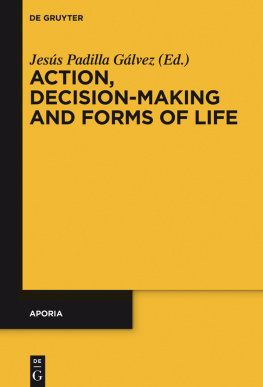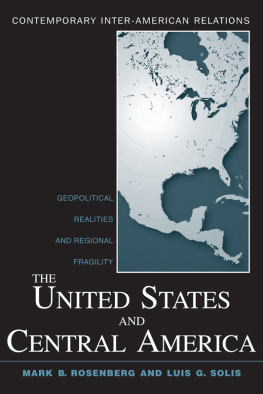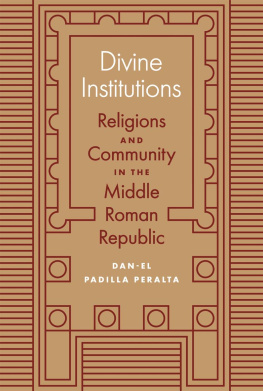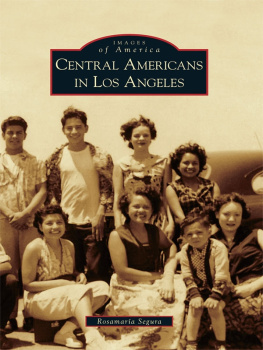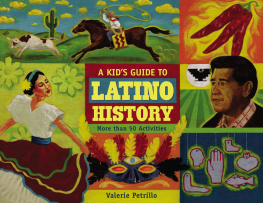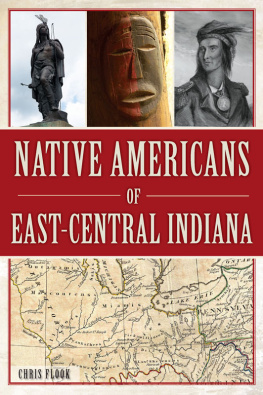LATINX: THE FUTURE IS NOW
A series edited by Lorgia Garca-Pea and Nicole Guidotti-Hernndez
Books in the Series
Marisel C. Moreno, Undocumented Migration in Hispanophone Caribbean and Latinx Literature and Art
Francisco J. Galarte, Brown Trans Figurations: Rethinking Race, Gender, and Sexuality in Chicanx/Latinx Studies
From Threatening Guerrillas to Forever Illegals
US CENTRAL AMERICANS AND THE CULTURAL POLITICS OF NON-BELONGING
Yajaira M. Padilla

University of Texas Press
Austin
Copyright 2022 by the University of Texas Press
All rights reserved
First edition, 2022
Requests for permission to reproduce material from this work should be sent to:
Permissions
University of Texas Press
P.O. Box 7819
Austin, TX 78713-7819
utpress.utexas.edu/rp-form
LIBRARY OF CONGRESS CATALOGING-IN-PUBLICATION DATA
Names: Padilla, Yajaira M., author.
Title: From threatening guerrillas to forever illegals : US Central Americans and the cultural politics of non-belonging / Yajaira M. Padilla.
Description: First edition. | Austin : University of Texas Press, 2022. | Series: Latinx: the future is now | Includes bibliographical references and index.
Identifiers:
LCCN 2021041579
ISBN 978-1-4773-2526-1 (cloth)
ISBN 978-1-4773-2527-8 (paperback)
ISBN 978-1-4773-2528-5 (PDF)
ISBN 978-1-4773-2529-2 (ePub)
Subjects: LCSH: Central AmericansUnited States. | Central Americans in motion pictures. | Central AmericansPress coverageUnited States. | Central AmericansLegal status, laws, etc.United States. | Immigrants in mass media. | Mass media and immigrantsUnited States. | Central American Americans. | Stereotypes (Social psychology) in mass media. | Central AmericaOn television. | Central AmericaIn popular culture.
Classification: LCC E184.C34 P33 2022 | DDC 305.868/728dc23
LC record available at https://lccn.loc.gov/2021041579
doi:10.7560/325261
To Steven and our two Salvicanas, Sayra and Camila
Contents
Acknowledgments
ALTHOUGH I BEGAN TO EXPLORE MANY OF THE IDEAS for this project long before my visiting fellowship at Arizona State Universitys Institute for Humanities Research in spring 2012, it was my time there that helped me to truly visualize what this project could be and the purpose that it might serve. I recall that following my introductory presentation to the rest of the fellows on what would become this project, one of them asked a rather pointed question about why I felt it was important to write a book about yet another ethnic minority, such as US Central Americans, when the ethnic studies field was under attack. Indeed, just two years prior, the then governor of Arizona, Jan Brewer, had signed into law H.B. 2281, a bill written in reaction to the Mexican American studies program implemented in Tucson public schools that, broadly, prohibited the teaching of ethnic studies in public and charter schools in the state. Though perhaps a valid and relevant question, I could not help but feel at the time that I was being asked to justify more than my project, that I was also being asked to justify why US Central American studies mattered and, relatedly, why US Central Americans like myself mattered. This feeling derived from my own experiences growing up in Southern California, where I not only often had to explain to people that I was Salvadoran American, not Mexican/Chicanx, and why that distinction was important (to me). That experience is also one that I had during my undergraduate and graduate studies and have continued to encounter in my years as an academic. Admittedly, I cannot remember what answer I gave to the question, but the query and the feelings triggered have long stayed with me and given shape to this project. In many ways, this book is my answer to that fellows initial question from the vantage point of critical scholarship (Ive long since stopped feeling the need to justify why I identify as Salvadoran American and am proud of being so).
I would like to begin these acknowledgments, therefore, by thanking the Institute for Humanities Research at ASU (the faculty, staff, and other fellows) for providing me an opportunity to further develop this project and for challenging me. I would especially like to thank Sujey Vega, who, like myself, was also a visiting fellow that spring, and Lee Bebout. Their support of my work, kindness, and friendship, which endure to this day, made my time all the more pleasant in Arizona. Similarly, I would like to thank Jorge Prez, with whom I was colleagues while we were both at the University of Kansas. Thank you, Jorge, for reading early drafts of articles that provided material for this book and for remaining a good friend and peer mentor throughout the years. I also owe a debt of gratitude to pioneering scholars such as Ana Patricia Rodrguez, Cecilia Menjvar, Leisy Abrego, and Arturo Arias, who, along with others, have established the field of US Central American studies and paved the way for scholars like myself. All of you have been supportive of me professionally and generous with your knowledge and time. Without your provocative work and commitment to the field, this project would not be possible. The same is true of the US Central American artists, poets, writers, and activistsboth known and those who are yet to bewhose work and resilience inspire my research. Thank you to Nicole Guidotti-Hernndez and Lorgia Garca Pea, for taking an interest in this project. I am so excited to be part of your newly launched series Latinx: The Future Is Now. At the University of Texas Press, I would also like to thank my editor, Kerry E. Webb, for being so welcoming when we first met and for seeing this project through from beginning to end. I am equally grateful to my anonymous reviewers for their critical eyes and suggestions for improving the manuscript.
At the University of Arkansas, my faculty home since 2013, I also have many people to thank. My colleagues and writing group partners, Robin Roberts, Susan Marren, Lissette Szwydky-Davis, and Constance Bailey, have been stalwart readers of multiple chapter drafts and pillars of support, encouraging me to keep going and finish this book even when the confidence and will to do so eluded me. All of us in this profession should have such a group of women in their corners. The Humanities Center at the University of Arkansas provided me with a subvention grant that helped defray the copyright cost of some of the images included in this book, for which I am also grateful. Outside of the university, I would like to thank my friend Jane Daniels, one of the most fascinating people I have ever met. Our shared conversations at the neighborhood Starbucks where we first encountered each other, and where I spent a lot of my time writing this book, were a welcome respite from what was often a lonely endeavor. In this regard, Alicia Yvonne Estrada and Maritza E. Crdenas also merit special recognition and appreciation. More than just colleagues, you fierce centroamericanas have become true friends who have helped me both weather difficult situations and celebrate achievements in my personal and professional life with humor, humility, and compassion.
To my parents, Oscar and Alicia Padilla, and my siblings, Georgina, Lisa, and Oscar, and their families, I also want to say thank you. As complicated as all of our relationships can be, I am glad to be a part of this dynamic and growing family. And knowing that you are all there for me and love me despite the distance that separates us comforts me when I need it most. Last, but certainly not least, I would like to thank my daughters, Sayra and Camila, and my spouse, Steven. Sayri and Cami, you are what makes everything I do worth it. I am grateful for the unconditional love you give me, for the boundless excitement and smiles with which you greet me each morning and throughout the day, and for your patience with me, especially this past year, in which all of our lives were upended by the COVID-19 pandemic and I labored to finish this book. Steven, thank you for being the best co parent I could have asked for. You selflessly gave so much so that I could have the gift of time to complete this book, taking the lead with our girls, time and again, and ensuring that our household and family needs were met. Simply put, this book would not exist without you, and, more important, this family and my world do not function without you. Thank you for being who you are and for your unfailing love throughout this adventure of a life we have embarked on and continue to navigate together.


